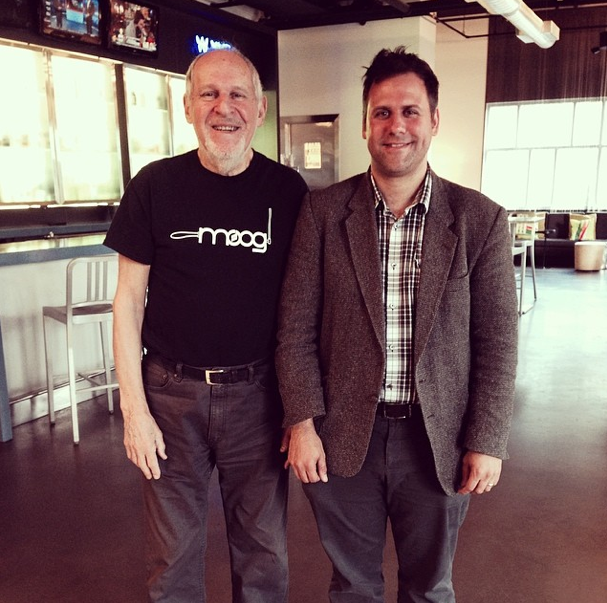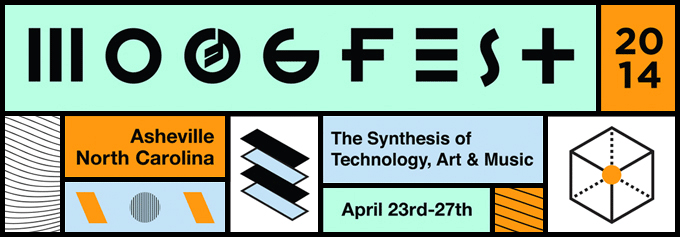When Herb Deutsch speaks, it’s best to listen. Bob Moog’s former colleague and one of his foremost inspirations in pursuing electronic music, Deutsch ably wielded his experience Thursday afternoon at Diana Wortham Theatre.
Leading the audience in his own entertaining way through the history of the genre in which he was so instrumental, Deutsch began with a reading from composer Jim Cage’s prophetic writings on sound from the late 1930s while the dissonant tunes of Edgard Varèse (whose “Poème électronique,” composed for the 1958 World’s Fair is considered the first electronic piece) played in the background.
Clearly enjoying himself, the smiling Hofstra University professor then moved to the theremin (“I love to play this thing”) before shedding his tan “Question Tonality!” t-shirt for a blue ringer tee hidden beneath featuring a Moog Rogue print and starting in on a Mini Moog. Playing a piece written in 1980 by The Moog Band, comprised entirely of Moog employees in Buffalo with the exception of its drummer, he showcased the instrument’s melodic qualities without skimping on its outer space capabilities.
Before the next transition, Deutsch promised that he wouldn’t take off the Rogue shirt, not wanting to show the effects of “very serious heart surgery” that he recently underwent. Showing no signs of slowing down, he played the famous recording of Bob Moog performing one of the first synthesizers in the fall of 1964, shortly after its development that summer. Addressed to Deutsch, Moog’s greeting and running remarks (“I’d appreciate your comments on what the potential of a contraption like this is”) as he tinkered with the instrument likewise gave his friend a contagious case of the giggles.
Other stops on the DWT stage included a rendition of Deutsch’s 1964 creation “Jazz Images” on a baby grand piano, his answer to Moog’s question of, “Can someone write a little ditty?” Playing the keys with one hand and striking the exposed strings with a mallet with the other, Deutsch occasionally picked up a trumpet in his right hand while the left worked away on the keys and the original synthesizer piece played over the auditorium speakers.
Moving back to the Mini Moog, he noted that he doesn’t look at something like what he’d just played as great music, but originally as a way to make fun (“not in the worst way, but in the best way”) of jazz and with the new instruments. Soon joined on theremin by his friend Dorit Chrysler, fresh from her daily performance at the Odd Harmonics installation, he delved into 1960’s “In Real Time,” an exploration of usually lengthy minimalism that he said they would “play as long as we feel like playing it.”
At its close, just over two minutes later, Deutsch proclaimed, “That was absolute improvisation,” and espoused on the history of such an approach, noting that Mozart and Hayden used to “jam in string quartets together.” He took that concept one step farther with his closing number “Lost Your Number,” a piece in which a telephone number that he typically takes from an audience member (“I won’t do that to you”) corresponds with the notes on his keyboard (e.g. 6 = A; 8 = C).
After the surprisingly catchy tune, Deutsch thanked his appreciative audience one last time and left them with another grin-inducing statement: “It’s such a ball to do the things that I love, and that’s playing music.”





Before you comment
The comments section is here to provide a platform for civil dialogue on the issues we face together as a local community. Xpress is committed to offering this platform for all voices, but when the tone of the discussion gets nasty or strays off topic, we believe many people choose not to participate. Xpress editors are determined to moderate comments to ensure a constructive interchange is maintained. All comments judged not to be in keeping with the spirit of civil discourse will be removed and repeat violators will be banned. See here for our terms of service. Thank you for being part of this effort to promote respectful discussion.